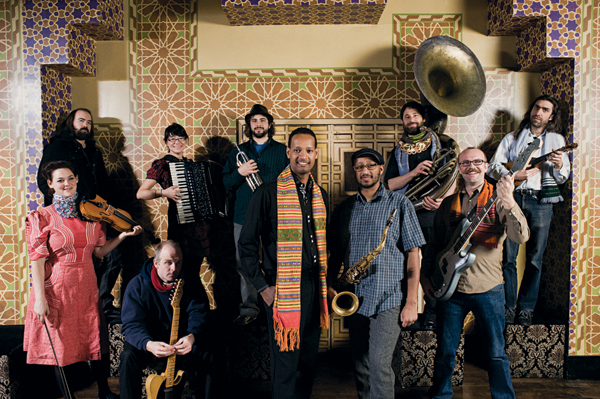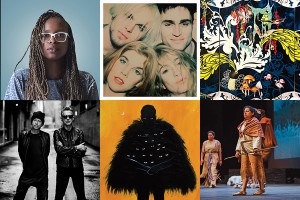Addis Acolytes: Debo Band

Debo Band plays Brighton Music Hall on December 6. / Photo courtesy of Debo Band
It takes a special sound to stitch together a national fan base of NPR-listening intellectuals, Pitchfork-reading indie snobs, and African expats. A sound like the one produced by the Boston-based Debo Band, an 11-person powerhouse that plays funky, soul-stirring Ethiopian music and features a full horn section, an accordion, two violins, and seriously loud guitars, bass, and drums.
In the past year and a half, Debo Band has filled some of the largest stages in rock music. And this summer the band released its debut album on the legendary indie-rock label Sub Pop. Now it’s poised to join the Dropkick Murphys and Passion Pit as one of the biggest bands to emerge from Boston in recent history. Not bad for a J.P. group led by a sax player, Danny Mekonnen, who has both personal and musical roots in Africa.
In the 1970s, Mekonnen’s parents fled the oppressive military junta in Ethiopia and settled down in Texas. Thanks to his family, Mekonnen grew up listening to Ethiopian ballads, jazz, and soul, and his love for all of it fueled his studies at Harvard, where he earned a master’s in ethnomusicology.
In 2006, while living in J.P., Mekonnen decided to put together his own band, inviting local Ethiopian musicians as well as a few rock, jazz, and classical players to join the group. In the beginning, Mekonnen did almost all the arrangements, influenced by the likes of Haile Selassie’s Theatre Orchestra and Imperial Bodyguard Band. As time went on, other band members began contributing pieces, but Debo’s style remained based on the traditional Ethiopian pentatonic scale, which infuses danceable rhythms with haunting, aching melodies.
Mekonnen credits much of Debo’s power and cohesion to the band’s trips to Ethiopia. “Parts of it were surreal,” he says, “being there with my friends from Jamaica Plain…. It felt meaningful and profound. The musicians there said we found our own sound, and we all came back inspired by that.”

